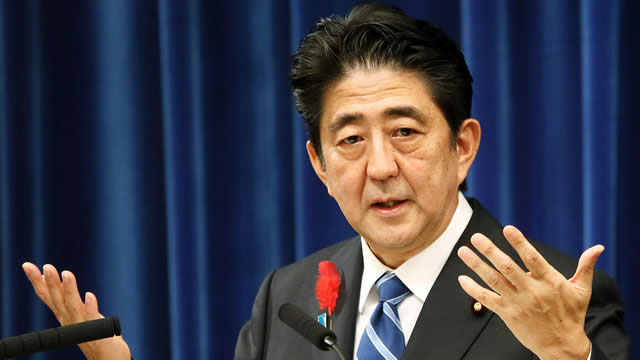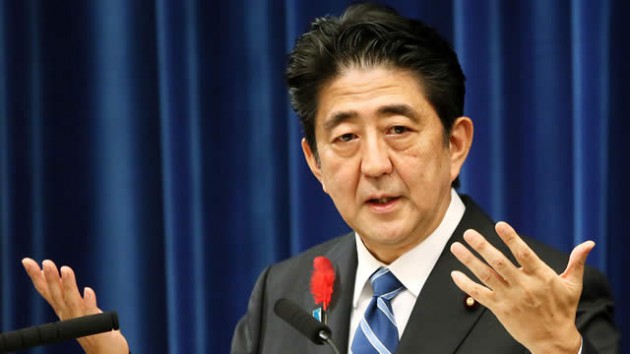President’s Japan visit a worthy cause


President Mugabe’s trip to Japan was at the behest of Japanese Prime Minister Shinzo Abe (pictured above)
Tafara Shumba Correspondent
Japan showed a serious commitment to invest in Zimbabwe’s various economic sectors. As a show of this commitment, a co-ordinator from Japan will soon be deployed here to look into the various investment opportunities available for Japanese businesspeople.
The recent trip to Japan by President Robert Mugabe attracted undue criticism from the people who want to see Zimbabwe remain in perpetual economic quagmire.
In the Bible, a story is told of a man called Lazarus, whom Jesus resurrected four days after his death. Stretch your mind’s eye a bit and put this miracle in a Shona context, where the deceased’s movable property is distributed among the close relatives within a period ranging from one day to a year after his or her interment. With the high cost of travelling these days, that custom is now done a day or two after burial.
Imagine, after four days, people being called to return Lazarus’ property. One can envision an uncle blowing his own horn at the township while donning Lazarus’ best suit and suddenly receives the resurrection message. Obviously he would not be amused, for he certainly knows that this would spell the end of his momentary bequest. He would even curse Jesus for resurrecting Lazarus.
Zimbabwe is going through an economic resurrection that has worked up many people who were deriving egoistic political profits from the economic morass occasioned by the illegal sanctions. Opposition political parties in particular have a tradition of striving on crises. Thus, Zimbabwe’s economic restoration is not a welcome development to them.
The country has survived through the evil sanctions mainly because of the Look East policy and the God-given natural endowments. While the West maintained their sanctions, countries from the East such as China and India, among others, have been immensely benefiting from the symbiotic trading relations with Zimbabwe.
The sanctions have not achieved their intended national insurrection. It is this realisation that some of the countries that had joined Britain in imposing sanctions on Zimbabwe over a bilateral matter started on a policy shift.
Most of them are in a rush to re-engage Zimbabwe. The country has hitherto received high-powered business delegations from the US, Belgium, France and others who all showed interest to invest in the Southern African land of honey and milk.
Japan is one such a country that has joined the re-engagement bandwagon. The re-engagement initiative started in August 2012 when a 15- member business delegation from Tokyo visited Harare under the Alliance Forum Development Programme (AFDP).
The delegation comprised Japanese company representatives in the railway, energy, water, sanitation, pharmaceutical and other economic sectors. Successive meetings were held between President Mugabe and Prime Minister Shinzo Abe in 2013 and 2015 where they showed commitment to the full-scale resumption of bilateral economic co-operation.
Following its warped decision to fight in the corner of the West, Japan had withdrawn direct aid to Government preferring to channel it through United Nations (UN) agencies and non- governmental organisations (NGOs). Tokyo even discouraged Japanese businesspeople from investing in Zimbabwe and those that had invested pulled out. Trading between the two countries had dwindled so much that Japan only imported nickel and ferrochrome from Zimbabwe.
President Mugabe’s recent trip to Japan is a show of re-engagement efforts by the Far East Asian country, which for over a decade had Western leanings. Opposition political parties which were meant to be beneficiaries of the sanctions feel betrayed and so do their allies in the civic society and the media. That anger manifested itself in the recent attacks and bastardisation of the President’s trip to Japan.
The trip, which was at the behest of the Japanese premier, was portrayed in the private media as one of those money spending sprees. The media attempted to downplay the benefits that Zimbabwe is set to reap from Japan. There was even an attempt to scandalise and embarrass President Mugabe by circulating a manufactured video of him purportedly dozing off at a pulpit.
In the face of all that gibberish being said and written, the President’s official trip to Japan was a worthy cause. Zimbabwe is set to harvest myriad socio-economic benefits from that trip.
Japan showed a serious commitment to invest in Zimbabwe’s various sectors of the economy. As a show of this commitment, a co-ordinator from Japan will soon be deployed here to look into the various investment opportunities available for Japanese businesspeople.
The key investment initiatives proposed by Japan will enhance the attainment of objectives set in the Zimbabwe Agenda for Sustainable Socio-Economic Transformation (Zim-Asset). The opposition political parties are aware that the success of Zim-Asset will make Zanu-PF an indomitable party.
Thus, to them, Japan’s re-engagement initiative must be stifled in every manner. This is the reason why the trip coincided with a heightened interrogation of the indigenisation law, renewed interest in the whereabouts of Itai Dzamara and spurious reports on human rights violations by certain NGOs.
It is laudable that the President managed to clarify the indigenisation law to the satisfaction of the Japanese business community. That clarification allayed fears of expropriation of foreign companies, which the private media had wanted to portray so as to scare away foreign investors.
Japan pledged to invest in the telecommunications, agriculture, water reticulation system in urban areas, sanitation and road and railway projects. They will also invest in electricity generation and supply as well as providing opportunities for Zimbabwean students to study Information Communication and Technology at their higher learning institutions.
All these investment proposals are key areas of development identified under Zim-Asset. With the frequent droughts induced by unfavourable climatic conditions, irrigation projects should be a panacea to food shortages. The electricity generation will also go a long way in ensuring that Zimbabwe becomes self-sustaining.
It is therefore blatantly dishonest for anyone to downplay these mega benefits that the President’s trip harvested.









Comments